Replacing your car battery with eco-friendly alternatives significantly reduces environmental impact by minimizing pollution and ecological damage from traditional lead-acid batteries. The growing demand for sustainable options, driven by technological breakthroughs and consumer consciousness, has led to advanced alternatives like lithium-ion and nickel-metal hydride. Lithium-ion batteries are popular among environmentalists due to higher energy density, extended lifespan, and reduced electronic waste. Lead-acid batteries remain a viable option with improved production methods and recycling processes. Innovative options like solid-state and sodium-ion batteries offer enhanced performance and cost-effectiveness. When choosing a replace car battery, consider compatibility, certifications, specifications, and warranties for optimal sustainability and functionality. The future of automotive power sources leans towards sustainability, promising reduced waste, lower emissions, improved vehicle performance, longer lifespans, faster charging, and more cost-effective green transportation solutions.
Looking to replace your car battery and do your part for the environment? Traditional batteries have a significant ecological impact, contributing to waste and toxicity. But fear not! The rise of eco-friendly battery alternatives marks a sustainable revolution. From lithium-ion to innovative options like flow batteries and solid-state tech, this article explores 5 top choices for green car battery replacement. Discover how to make an informed decision while contributing to a cleaner future.
- Understanding the Impact of Traditional Car Batteries on the Environment
- The Rise of Eco-Friendly Battery Alternatives: A Sustainable Revolution
- Lithium-Ion Batteries: A Popular Choice for Environmentalists
- Lead-Acid Batteries: Still Relevant in Eco-Conscious Choices
- Other Innovative Options for Green Battery Replacement
- How to Choose the Best Eco-Friendly Car Battery Replacement
- The Future of Sustainable Automotive Power Sources
Understanding the Impact of Traditional Car Batteries on the Environment

Traditional car batteries, while essential for powering our vehicles, have a significant environmental impact throughout their lifecycle. From the extraction and processing of raw materials like lead and lithium to the toxic waste generated during disposal, these batteries contribute to pollution and ecological damage. The harmful substances present in conventional batteries can contaminate soil and water sources if not properly recycled, posing risks to local ecosystems and human health.
As such, the decision to replace your car battery becomes a crucial step towards mitigating these environmental concerns. Opting for eco-friendly alternatives not only reduces your carbon footprint but also supports a more sustainable future. By choosing batteries with recyclable or non-toxic components, you contribute to minimizing the negative impact on our planet, ensuring a cleaner and greener environment for generations to come while efficiently powering your vehicle’s electrical systems.
The Rise of Eco-Friendly Battery Alternatives: A Sustainable Revolution
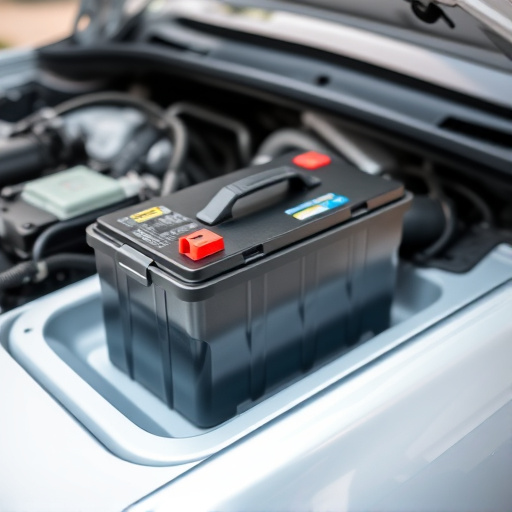
In recent years, the demand for eco-friendly car battery replacement options has skyrocketed, driving a sustainable revolution within the automotive industry. The traditional lead-acid batteries, long the go-to choice for vehicles, are increasingly being replaced by newer, greener alternatives. This shift is not just about reducing environmental impact; it’s also fueled by advancements in technology and a growing consumer awareness of the ecological footprint left by conventional batteries.
The rise of electric vehicles (EVs) has been a significant catalyst, as automakers race to meet stringent emissions standards and consumer demands for cleaner transportation options. Beyond EVs, there’s a growing market for replaceable batteries in hybrid vehicles and even some traditional internal combustion engine cars looking to reduce their carbon footprint. This has led to the development of innovative solutions like lithium-ion, nickel-metal hydride, and upcoming technologies that promise even greater energy density and longer lifespans, making them not just sustainable choices but also cost-effective ones.
Lithium-Ion Batteries: A Popular Choice for Environmentalists
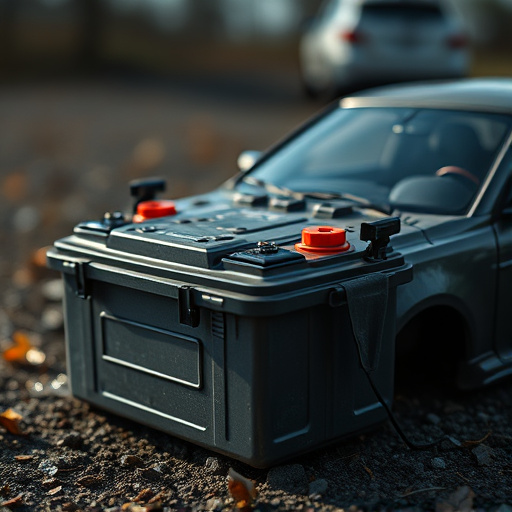
Lithium-ion batteries have emerged as a popular choice among environmentalists for replacing car batteries, and for good reasons. They offer an eco-friendly alternative to traditional lead-acid batteries, with several key advantages. Firstly, lithium-ion batteries are more energy-dense, meaning they can store more energy in a smaller space, which is crucial for compact automotive applications. This reduces the overall weight and volume of the battery pack, making it lighter and easier to recycle or dispose of responsibly.
Secondly, these batteries have a longer lifespan and require less frequent replacement compared to lead-acid alternatives. This longevity translates into fewer resources used in production and fewer electronic waste outputs over time, which aligns with sustainability goals for both consumers and the planet. Additionally, their high energy efficiency contributes to improved vehicle range on electric and hybrid vehicles, making them an attractive option for those looking to reduce their carbon footprint through more sustainable transportation methods.
Lead-Acid Batteries: Still Relevant in Eco-Conscious Choices
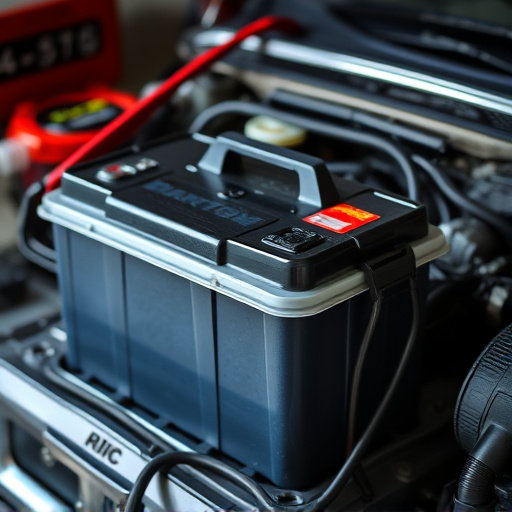
Despite the emergence of more advanced battery technologies, lead-acid batteries remain a relevant option for those seeking eco-friendly car battery replacements. While they may not be as efficient or long-lasting as lithium-ion batteries, their production and disposal have become more sustainable over time. Modern lead-acid batteries are designed with environmental considerations in mind, featuring improved recycling processes and reduced lead content.
When considering a replace car battery, it’s crucial to understand that lead-acid batteries still play a significant role in promoting eco-conscious choices. Their widespread availability, competitive pricing, and established recycling infrastructure make them an attractive option for drivers looking for affordable and easily accessible green alternatives.
Other Innovative Options for Green Battery Replacement
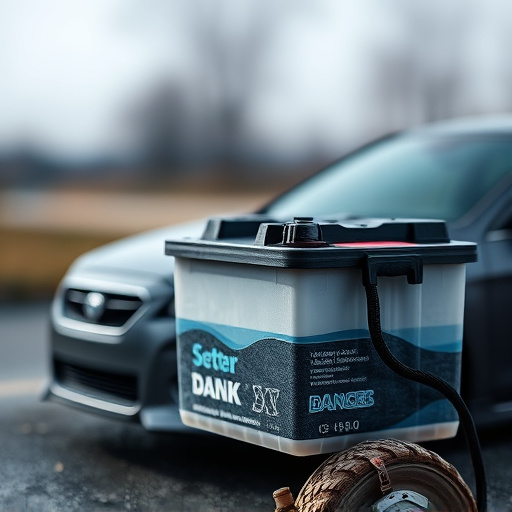
Beyond lithium-ion batteries, several other innovative options are emerging in the realm of green battery replacement for cars. For instance, solid-state batteries offer enhanced safety and energy density compared to traditional lithium-ion batteries. These next-generation batteries use a solid electrolyte rather than a liquid one, reducing the risk of thermal runaway and improving overall performance.
Another promising area is the development of sodium-ion batteries, which are cheaper and more abundant than lithium alternatives. While they may not match the energy density of lithium-ion batteries, sodium-ion batteries have shown potential for applications where high power rather than high energy is required, such as electric vehicles with shorter ranges or backup power systems. These advancements highlight the ongoing efforts to make car battery replacement more sustainable and cost-effective.
How to Choose the Best Eco-Friendly Car Battery Replacement

When considering an eco-friendly car battery replacement, it’s crucial to look beyond the green credentials of the product and evaluate its performance, longevity, and compatibility with your vehicle. The best choice will offer a balance between environmental sustainability and reliable functionality.
Start by understanding your vehicle’s specific requirements and checking if the replacement battery is designed for your make and model. Look for certifications indicating eco-friendly production methods and materials, such as those from renowned environmental standards bodies. Additionally, consider the battery’s energy density, cold cranking amps (CCA), and warranty period. Opting for a battery with higher CCA ensures better performance in colder climates, while a longer warranty provides peace of mind.
The Future of Sustainable Automotive Power Sources
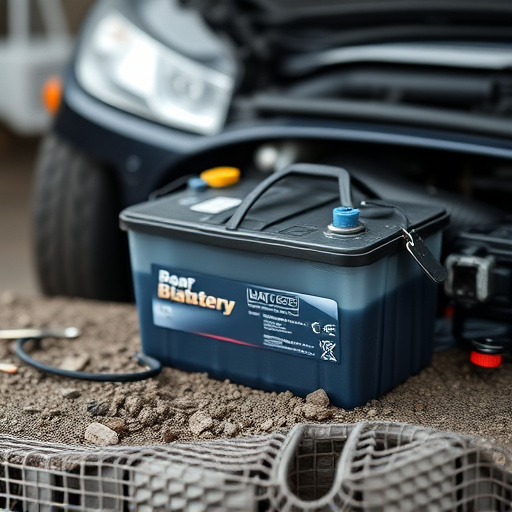
The future of sustainable automotive power sources looks promising as the demand for eco-friendly alternatives continues to grow. With advancements in technology, replacing conventional car batteries with greener options is becoming increasingly feasible and cost-effective. This shift towards sustainability not only benefits the environment by reducing waste and greenhouse gas emissions but also offers drivers long-term savings and improved vehicle performance.
As we move forward, expect to see more innovation in battery chemistry, leading to longer lifespans, faster charging times, and higher energy densities. These advancements will make electric vehicles (EVs) even more appealing, encouraging a wider adoption of green transportation. Additionally, the development of recycling programs for EV batteries will further solidify their role as a sustainable solution for replacing traditional car batteries.
In conclusion, transitioning to eco-friendly car battery replacements is a significant step towards mitigating the environmental impact of traditional batteries. With options ranging from lithium-ion to innovative new technologies, consumers now have diverse and sustainable choices for their vehicular power sources. When considering a replace car battery, opting for an earth-conscious alternative not only benefits the environment but also contributes to the advancement of green energy in the automotive sector.
